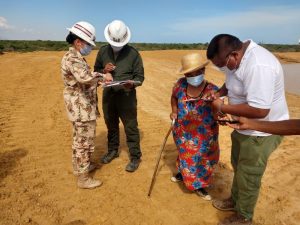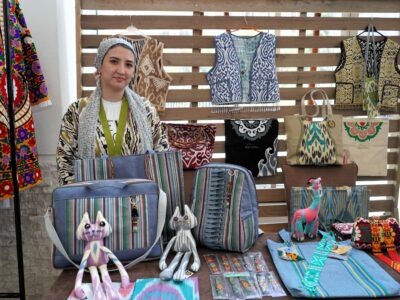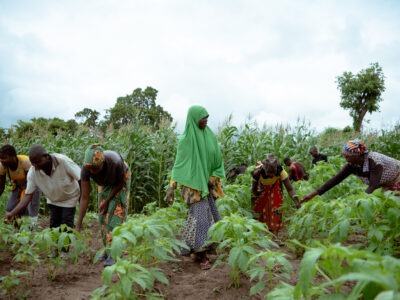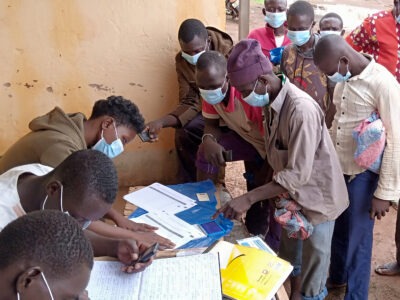
When it comes to water, La Guajira is a paradox. As Colombia’s largest and northernmost department, it boasts 1,642 kilometers of striking Caribbean coastline, attracting tourists from all over the country and the world. However, its 8,200 square kilometers of inland territory are almost entirely arid desert. In this beautiful yet formidable natural environment, fresh water – essential for cooking, bathing, and of course, drinking – is extremely hard to come by.

Despite its many assets, including a uniquely diverse population of indigenous Wayúu, Afro-descendants, and Venezuelan migrants, La Guajira also faces some of the country’s toughest challenges. In particular, the region’s infrastructure for importing fresh water from other areas, as well as safely collecting and storing rainwater from sporadic tropical storms, is underdeveloped. As a result, communities are vulnerable to prolonged periods of drought, coupled with sicknesses that arise from suboptimal water collection and filtration methods.
ACDI/VOCA in Colombia is addressing access to water in La Guajira through two activities in the remote region. In one project, Fundación ACDI/VOCA LA is working alongside Wayúu communities as well as the Ministry of Housing, Enel Green Power, the Colombian Army, and Uribia and Maicao Mayor’s Offices to build or renovate 16 pond-like reservoirs, or “jagüeyes” in the Wayuunaiki language. The goal of this $800-million initiative is to promote access to safe water and strengthen resilience and adaptability in the face of climate change for more than 3,000 people from 22 Wayúu communities. In this true public-private partnership, Wayúu leaders identified the best locations for each of the jagüeyes, while the private company and the army’s engineering division contributed machinery and technical assistance. In tandem, Fundación ACDI/VOCA LA and USAID’s Program Alliances for Reconciliation (PAR) supported the involved government agencies in the innovative and sustainable design for the jagüeyes.
In another activity, the USAID-funded Emergency Response in Colombia (ERIC) program implemented by ACDI/VOCA is working to improve food security and water, sanitation, and hygiene (WASH) for communities in the municipality of Uribia, 92.2 percent of whose inhabitants are living in extreme poverty. The program builds on the success of the Emergency Response in Arauca (ERA) I & II programs, which ACDI/VOCA executed from 2018 to 2020, in seven settlements in the border town of Arauca. The goal of these initiatives was to mobilize a concrete and effective response to the needs for drinking water, improved environmental health, food security, and protection for Venezuelan migrants, Colombian returnees, and members of the host communities.
New ERIC Project Builds on Past Experiences & Successes
Following the culmination of the ERA program, ERIC launched in November 2020 with an initial focus on Uribia’s southwestern settlement of La Esperanza, home to 9,178 people spread over 1,675 households. The settlement has grown significantly in recent years due to the Venezuela migration crisis and internal displacement caused by water shortages and harsh climatic conditions in the surrounding area, which have made it increasingly difficult for communities to produce their own food.
During the first months of implementation, ERIC’s priorities have been training, local awareness-building, collecting data, and designing technical support plans. They have also begun sourcing key equipment and materials including water filters, microbiological kits, water storage tanks, solid waste disposal cans, agricultural hardware, seeds, and fertilizer that will be used during upcoming WASH and food security workshops. Water quality sampling and testing recently began with a group of 30 families, along with preparations for exploration and drilling for solar powered wells.
ERIC will engage with La Esperanza citizens through training workshops and activities organized by the settlement’s community leaders. In collaboration with municipal and departmental agencies, the private sector, and other international cooperation agencies, the program ultimately seeks to support 530 households in La Esperanza under the water, sanitation, and hygiene (WASH) umbrella.
“Water is the motor of life, in our cultural cosmogony water is our father, the deity that travels with the winds and arrives each season to give life to the earth. In our daily reality, water is everything, it is the backbone of our existence in our territory. Water gives life to our families, our animals and with water we sow the earth.”
— María Eugenia Ipuana, traditional leader from the Namunatu community
Read about our work in Colombia.
Read more about Emergency Response in Colombia here.
Read about the Program of Alliances for Reconciliation here.
Read about the Emergency Response in Arauca I project here.
Read about the Emergency Response in Arauca II project here.
Read about the Building and Rehabilitating Water Reservoirs for Indigenous Communities in La Guajira project here.
Read more about the Fundación ACDI/VOCA LA here.








